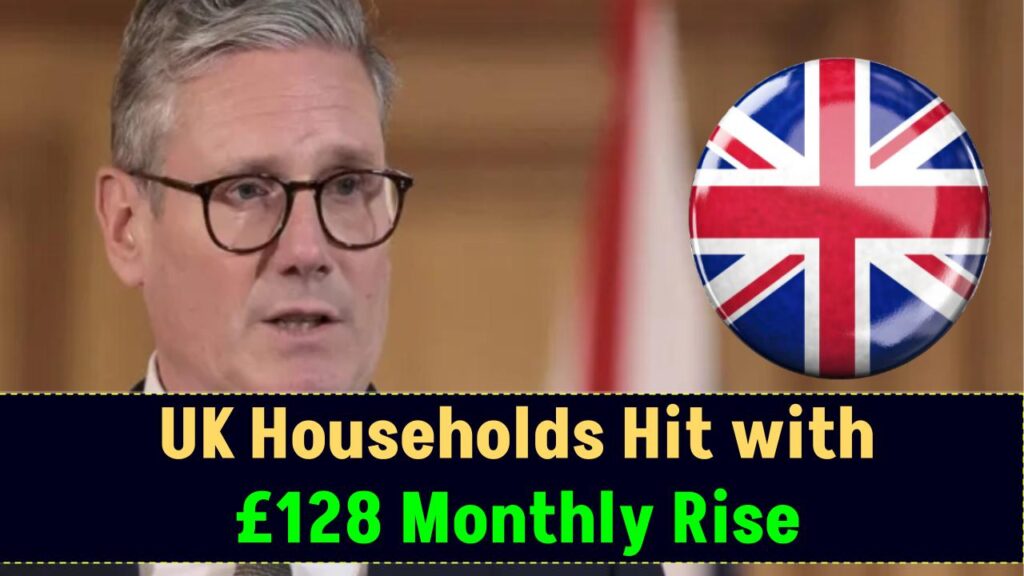
UK Residents Face £128 Monthly Increase: UK households are facing a £128 monthly increase in living costs starting April 2025, driven by higher energy bills, rising food prices, and housing expenses. But here’s the good news: several government-backed schemes and benefits are available to help eligible residents manage these costs.
UK Residents Face £128 Monthly Increase
| Topic | Key Information |
|---|---|
| Monthly Living Cost Increase | £128 average rise per household from April 2025 |
| Main Cost Drivers | Energy bills (£45), food inflation, housing expenses |
| Available Benefits | Up to £10,250 in total annual support for eligible individuals |
| Help to Save Scheme | 50% savings bonus, up to £1,200 over 4 years |
| Household Support Fund | £742 million allocated for essentials like food and energy |
| Energy Efficiency Help | Insulation scheme can save £300–£400 annually |
| Housing Support | Includes discretionary housing payments and rent assistance |
| Check Eligibility | Use Turn2Us and Entitled To benefit calculators |
| Official Help to Save Site | gov.uk/get-help-savings-low-income |
While the £128 monthly cost increase may feel like a burden, you don’t have to navigate it alone. There are multiple government schemes designed to support you—from cash savings to housing relief and energy assistance.
By taking action now, you can ease the pressure, stretch your budget further, and build a more financially secure future.
Why Are Living Costs Increasing in April 2025?
The £128 monthly increase represents an average jump in household expenses across the UK due to:
- Energy price cap adjustments – approximately a £45 increase
- Ongoing food inflation driven by higher production and supply chain costs
- Rising housing expenses, including rent hikes and council tax increases
Please note: Costs will vary depending on location, housing type, and personal circumstances.
Financial Support Schemes You Can Access
1. Universal Credit & Linked Freebies
If you’re receiving Universal Credit or other income-based benefits, you could be eligible for several supplementary aids totaling up to £10,250 annually:
- Council Tax Reduction – Save up to £2,280
- Energy Support Grants – Worth up to £2,000
- Water Bill Discounts – Up to £316 per year
- Free NHS Prescriptions – Valued around £119 per year
- Childcare Support – Worth up to £1,769
- Free School Meals – Save up to £655
- Sure Start Maternity Grant – One-off payment of £500
- Healthy Start Scheme – Up to £442 annually
- Discounted Gym Memberships – Approx. £240 savings per year
These benefits vary by region and your personal situation. Use tools like Turn2Us or EntitledTo to verify eligibility.
2. Help to Save Scheme
The Help to Save program is an excellent savings tool for low-income individuals. Here’s how it works:
- Save up to £50 per month for 4 years
- Receive a 50% bonus from the government
- Earn up to £1,200 in bonus payments over four years
As of April 2025, all working Universal Credit claimants are eligible. To apply, visit the official Help to Save site.
3. Household Support Fund (£742 Million)
The government has allocated £742 million to local councils in England for April 2025 to March 2026. This fund helps residents cover:
- Food and groceries
- Gas and electricity bills
- Rent or mortgage payments
Each council sets its own distribution criteria. Contact your local council for application details.
4. Great British Insulation Scheme
Want to cut your energy bills and make your home more efficient? The Great British Insulation Scheme is here to help:
- Save £300–£400 annually on heating costs
- For homes with EPC ratings of D or lower in council tax bands A–D
- Includes: loft insulation, cavity wall insulation, and more
Check your eligibility and apply via gov.uk.
Housing Support Options
Despite benefit increases, Local Housing Allowance (LHA) rates remain frozen for 2025/26, creating shortfalls for many renters. However, these support programs are still available:
- Discretionary Housing Payments (DHPs) – Short-term help to cover rent gaps
- Welfare Assistance Schemes – Emergency financial support from local authorities
- Household Support Fund – Can also cover rent and utility bills
To apply, visit your local council’s website and be prepared to provide:
- Recent bank statements
- Proof of rent or mortgage payments
- Documents showing income and expenses
Next Steps: How to Get Support
Here’s a step-by-step guide to take advantage of the help available:
- Use Benefit Calculators:
- Turn2Us
- EntitledTo
- Contact Your Local Council:
- Search online: “Your Council Name + Household Support Fund”
- Ask about DHPs, free school meals, and other support programs
- Open a Help to Save Account:
- Apply via gov.uk
- Create a Government Gateway ID if you don’t already have one
- Apply for Energy Efficiency Help:
- See what insulation support your home qualifies for at gov.uk
$250 & $750 Pension Payments for these Australians in April 2025
Carer Payment in Australia Just Got a 2025 Update – Here’s What’s Changing
$800 Stimulus Approved for April—Find Out If You Qualify and When You’ll Get It
FAQs on UK Residents Face £128 Monthly Increase
Who qualifies for Universal Credit-linked freebies?
Those on income-related benefits such as Universal Credit, Pension Credit, or Income Support may qualify. Use an eligibility checker like Turn2Us or EntitledTo.
Is the Help to Save bonus taxable?
No. The government bonus is completely tax-free and will not affect other benefits.
How do I apply for the Household Support Fund?
Visit your local council’s website to apply. Each council has its own application process and rules.
Is there a deadline to apply for insulation schemes?
No official deadline, but early applications are advised as funding is limited and demand is high.










